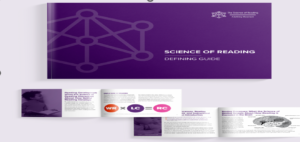The science of reading is a vast, interdisciplinary body of scientifically based research about reading and issues related to reading and writing. It is collated from researchers and practitioners in the following fields,
- Cognitive Psychology
- Education
- Linguistics
- Communication Sciences
- Developmental Psychology
- Implementation Science
- Neuroscience
- School Psychology
In 2022 The Reading League an organisation formed by Dr Maria Murray and her colleagues who were dedicated to the advancement of the awareness, understanding and use of evidence aligned reading instruction, coauthored a guide to explain the Science of Reading. (see attached link)
It explained… ‘Although the scientific evidence base for effective reading has existed for decades, the term “the science of reading” has gained traction in the last few years, potentially leading to misunderstandings. The Science of Reading: Defining Guide provides a firm definition of what the science of reading is, what it is not, and how all stakeholders can understand its potential to transform reading instruction…
The science of reading has culminated in a preponderance of evidence to inform how proficient reading and writing develop; why some have difficulty; and how we can most effectively assess and teach and, therefore, improve student outcomes through prevention of and intervention for reading difficulties’ (The Reading League, 2022).

What is the Science of Reading – The Reading League
This body of knowledge has helped debunk older methods of reading instruction that were based on tradition and observation, not evidence.
There continues to be intense public interest in questions surrounding how children learn to read and how they can best be taught. The attainment of reading skill has fascinated psychologists and invited more study than any other aspect of human cognition due to its social importance and complexity. Research spanning decades has provided answers to many of these questions but, somewhat surprisingly, it has been slow to influence educational policy and practice. Instead, the field has been plagued by decades of what has become known as “the reading wars.” (Castles, Rastle & Nation 2018).
Castles, A., Rastle, K., & Nation, K. 2018. Ending The Reading Wars: Reading Acquisition from Novice to Expert. Psychological Science in The Public Interest, 19(1), 5-51.
Studies of the developing brain have provided us with insights into how a child learns to read. Remember, reading is not a natural act, learning to read imposes significant cognitive burdens and at an age when cognition is only beginning to take form. Students need to develop the neural circuitry required to be successful at complex tasks.
Science should inform, not dictate practice. The science of reading offers insights from a cognitive perspective into how we develop as readers, how we learn to make phonological and orthographic connections, so that we can lift the words from the page and make meaning from text. But, to quote Willingham (2017), “seeking to make a reader out of a child who does not read is an educational goal, not a scientific one.” Scientific research into reading acquisition should inform teaching practice by adding to the teacher’s “mental model” of how students make meaning of text. It should also inform what is currently considered best practice however this still allows educators to decide which pedagogical techniques they will use to help students learn to read. (Riley, 2020)
The nature of scientific research is that it is ongoing, proven, disproven and challenged. However, the greater the evidence to support best practice, the more certain we are as educators that we are doing our very best for the students that are in our classrooms.
Beware techniques that do not align with the SOR or that have veiled old balanced literacy practice in SOR terms…look deeper into the practice.
References & Reseach
Willingham, D.T. (2017). The Reading mind: A cognitive approach to understanding how the mind reads. Hoboken, NJ: John Wiley & Sons.
Riley, B. (2020). Drawing on Reading Science Without Starting a War. Educational Leadership: Rooted in Reading, Vol.77, No.5.Drawing on Reading Science Without Starting a War
Science of Reading – Five from Five
Introduction to the science of reading | Australian Education Research Organisation
